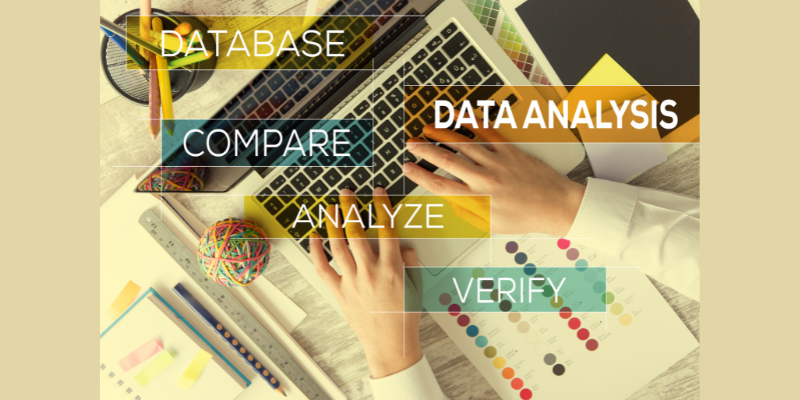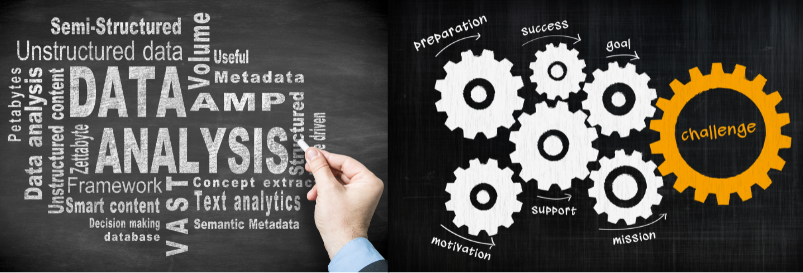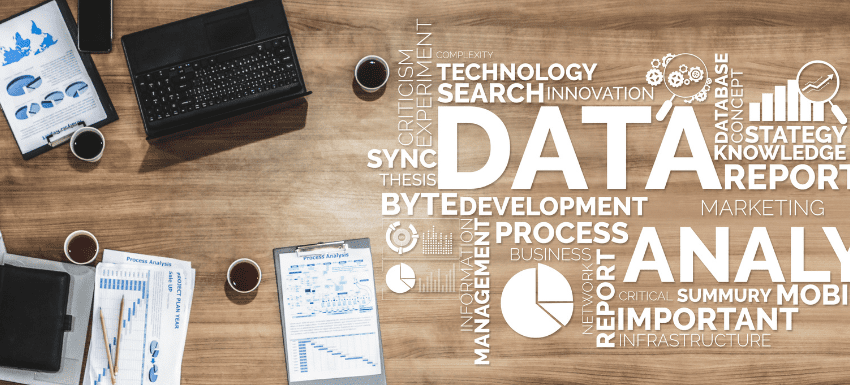Irrespective of business size and sector, data provides insights into business operations that help management and stakeholders to make informed decisions.
Importance of Data for the Growth of the Business
The value of data has risen to the top in today’s world of increasing challenges and competition because it gives businesses the information they need to make wise business decisions.

Based on accurate data, decisions made by stakeholders and management would lead the organization toward sustained growth and success. Businesses can better understand their operations and customers using data statistics.
Businesses of all types can make better decisions, mainly analyzing the data frequently results in effective operations and leads to higher earnings.
According to a Forbes report, 59% of companies use data analytics to improve decision-making and boost productivity. Every sector and industry, including marketing and sales, HR, IT, logistics, retail, and many more, uses data to identify trends and predict consumer behavior patterns, understand their customers, improve the quality of services, reduce costs, develop new products and solutions, innovate, and do various other things.
Nowadays, regardless of size or industry, data analysis is necessary for every firm. It is the cornerstone for growth since it enables firms to identify areas that may benefit from improvement, assess performance, and identify possibilities to advance their operations.
As a result, investing in data-driven technology can aid businesses in gaining a competitive edge and maximizing profits.
For SMBs and large organizations, data research and analysis may be valuable for decision-making, strategy development, and growth if data study and analysis are used effectively and efficiently.
What Is Data Literacy?
Data literacy is the process of interpreting, utilizing, comprehending data patterns, and drawing conclusions that will lead to successful business outcomes.

Data literacy is a collection of abilities and knowledge that enables people and organizations to use data in productive ways to achieve their goals. It involves comprehending the methods used to gather, organize, store, and use data and how to derive valid conclusions from it.
By knowing the many forms of data, such as data sources, types of analysis, and data hygiene, you will become more data literate. Meaningful data insights can be derived using data analysis tools, methods, and frameworks.
Another aspect of data literacy is knowing when data needs to be included, accurate, or more research is required. The final indicator of one’s data literacy is the ability to convey data-driven insights in a way that owners and other stakeholders can understand and act on.
Professionals knowledgeable about data can use it to analyze patterns, gain insights, and make decisions. As a result, data literacy is becoming increasingly crucial for managers, employees, and executive leadership who want to add value to their organizations.
Today all types of enterprises, irrespective of scale, depend entirely on data insights to make informed decisions and transform raw and random data into valuable business information.
In a nutshell, data literacy is gaining massive popularity across SMBs and large corporations as it helps increase productivity, innovation, and improved customer experience, leading to better ROI.
Why Is Data Literacy Important for Your Business?
If organizations want to withstand today’s competitive digital world, then data literacy is vital as it makes them possible to make decisions solely based on data to derive good decisions and outcomes.

Professionals skilled in data construction and analysis can process data to gain superior insights to aid efficient corporate operations and activities, enabling them to contribute value to their enterprises.
Enterprises that layout plans based on data facts are always one step ahead to capture opportunities on time, provide customer-specific solutions and products, and fine-tune the operations.
The data insights allow companies of all sizes to draw conclusions that let relevant stakeholders communicate better with employees, overcome bottlenecks, fill gaps, and deliver business value to customers, vendors, and suppliers.
Organizations resisting to adopt of data-driven decisions may go through a challenging phase to optimize, automate, and digitalize operations resulting in inadequate business results.
According to a Gartner survey, a lack of data literacy is the second-biggest internal barrier to success. Data literacy will be formalized by more than 80% by 2023, considering its ability to add business value.
Collaborative communication increased productivity, better customer service, improved decision-making, improved bottom lines, innovation, and work process efficiencies can all be achieved by organizations that adopt data literacy.
Challenges Associated With Data Literacy
The ability to interpret data and make decisions based on it has become increasingly crucial for Organizations in today’s data-driven world.

Data literacy, however, has its challenges. These challenges include a lack of specialized data skills, difficulty comprehending complicated datasets, difficulty managing vast volumes of data, and difficulty understanding and applying data in various contexts.
Organizations and professionals may need help to become data literate and make educated decisions due to these issues.
Skilled Employees: Qualified specialists should conduct data interoperation to achieve the desired results from the data sets. The organization needs specialists like data scientists, engineers, analysts, and architects.
Data Duplication: Since data is dynamic, it is evident that it will undergo various modifications throughout time. Companies should invest in pricey enterprise-grade solutions to maintain data on a wide scale and updated state.
Data Integrity: Organizations have to overcome issues like data errors due to human error, inconsistencies across data formats, data collection errors, and privacy breaches.
Lack of Integration: Due to the many data sets, sync difficulties, scalability, and flexibility, data integration from various departments is one of the biggest challenges. Companies may need to adopt new data integration or analysis techniques and tools.
Data Subsets: Data analysis involves a 360-degree perspective, so organizations must make the necessary integrations or upgradation to the database infrastructure, workflows, etc., to collect all data sets. Processing just one particular set of data would not provide critical insights or might only supply partial insights.
Physical and Logical: Organizations need specific hardware and software to process complex and huge data sets to analyze and make data-driven decisions, such as data storage, cloud space, algorithms, software packages, etc.
Expense: Data-driven decision-making requires data accuracy, consistency, and context, and these companies need to make necessary provisions and changes. It would lead to an extra expense for the organization.
Data literacy aims to give organizations a framework for making decisions based on actual data rather than on assumptions that will drive them to new heights.
Essential Data Literacy Skills and Concepts for Business
E-commerce sites tracking retailers’ purchases to company websites use cookies and website beacons to collect data at an extraordinary rate. But without data literacy skills, the significance of this data remains untapped.
In this section, let’s see the skills required to be data literate to derive business value.
Data literacy skills require understanding the functioning of datasets and manipulating and interpreting them to draw insightful conclusions that help organizations decide to propel company business.
At the core level, data literacy skills are not any specific set of skills to be acquired; it is a comprehensive package as stated below:
- Data Exploration: Exploring complex and scale data in terms of its sources, types, formats, etc.
- Data Management: Retrieving, cleaning, storing the correct data, etc.
- Data Use: Analyzing, interpreting, visualizing, reporting, etc.
- Domain Knowledge: To perform data pattern discovery, pattern recognition, and prediction
- Data Application: How an organization, such as business intelligence, digital transformation, decision support, artificial intelligence, automation, analysis, etc., will use data.
- Improvement: Examining data sets for gaps and errors to improvise results to achieve the purpose of the business.
Companies need professionals with technical, analytical, and statistical abilities to interpret data, draw insights, and ask the right questions at the right place to become an entirely data-driven organization.
In addition, Knowledge about data governance, security, and organizational standards and compliance help professionals keep data in safe and secure storage without breaching any policies and regulations.
Companies need to launch training and upskilling programs for employees to create proficiency in data literacy.
Business Concepts
The below concepts are essential for data-driven businesses:
- Data Analysis: Data analysis in terms of descriptive, diagnostic, and Predictive.
- Data Wrangling: It is the process of preparing raw data for further analysis, also called data cleaning.
- Data Visualization: The process of converting data into a visual representation in charts, tables, maps, infographics, etc. It helps the decision maker to do necessary business alignments.
- Data Ecosystem: Data analysis is a complex and resourceful activity, so the upgradation of necessary hardware and software is essential to get the desired output from data analysis.
- Data Governance: Organizational policies, guidelines, and compliance for end-to-end data analysis activity.
- Data Team: A team of skilled professionals to conduct data analysis activity and provide better insights to create business value.
As we move into the future, organizations will become more data-centric to drive business results, so the demand for professionals who demonstrate data literacy will continue to increase.
Organizations looking to excel based on data-driven facts can invest wisely to upskill their employees and infrastructure.
How to Build Data Literacy in Your Business?
As per a report from Accenture, only 25% of professionals feel that they use the data effectively, and even fewer, just 21% are confident in their data literacy skills.

The research states that organizations need to build data literacy skills to empower employees and make them confident to provide breakthrough results.
Let’s see how organizations can build a culture and encourage workers to be part of it:
Note: This is not a standard guideline or framework; it provides a broad outlook.
To start with, organizations can define data literacy goals, assess employees’ skill levels, and design appropriate learning paths. Precisely it can be rolled out in the following steps:
- Communicate the importance of data literacy to leadership and employees
- Identify data literacy gaps
- Design a data literacy program specific to employee needs
- Define goals and measure performance through KPIs
- Share and make data accessible to employees
- Get feedback and improve the program wherever essential
To gain the employee skill set and awareness, the following information is required:
- Skills of employees in statistical and logical operations
- Managers that are capable enough to construct and explain a workflow or process based on relevant numbers or data
- Abilities of data experts like data engineers, data analysts, and scientists who can explain the output of their AI and ML algorithms
Tools and Training: Organizations can create a data literacy learning program that provides essential tools and training to reach the desired level of data literacy.
The training follow-up to measures, track and monitor progress toward data literacy on an individual and organizational level to ensure that your program is working correctly.
Allowing flexibility and sufficient time for employees to practice data skills will help them become proficient at using data to add value to the organization.
Based on the inputs, organizations can set milestones and realistic goals to achieve desired levels of data literacy across the business units based on organizational compliance.
Upskilling will help businesses of all sizes and types implement and execute the data analysis program to land a data-driven decision.
Given the current competitive marketplace, the vast majority of companies are becoming increasingly aware of the need to increase their data literacy.
It is becoming more crucial for individuals and organizations to have the skills and resources required to analyze dynamic and complicated data as digitalization is gaining popularity and becoming the need of the hour.
Using the appropriate tools would undoubtedly add value and make the data analysis and insight-gathering process easier and faster.
All professionals can use these resources, ranging from online classes to interactive tutorials to learning programming.
The following are a few tools that would be helpful in the journey of data literacy.
One of the courses from Coursera worth looking at is Data Literacy Specialization.
Courses related to Data management, Business Intelligence, and Data warehousing would certainly add skills to data analysis and data management.
Professionals having experience and knowledge in programming languages such as Python and Java, database systems such as SQL and NoSQL, and operating systems such as UNIX and LINUX will gain the upper hand and stay ahead of completion in data analysis and get faster results.
Data Visualization: Raw data cannot be understood by the people outside the data analysis section, so the data need to be presented in a visual format to make it understood by respective business owners and stakeholders so that they can make related business decisions.
A few tools listed below can be used to portray data in various ways, including charts, infographics, and other visuals.
If you are looking for advanced data management, then you can look into AI, ML, and RPA courses. These courses will help professionals to dig deeper into data insights and create automation and innovations.
Final Words
It is said that if you don’t have a navigational compass, you will be lost in the ocean. The same concept is applied to data. Without data-driven decisions, there is a high probability that businesses of all sizes and types may lose competitiveness in the highly demanding environment.
Every part of the web world is collecting data at an extremely high rate. As we move forward, we need to upskill data literacy skills and use them to drive business decisions to add value in productivity, customer satisfaction, automation, innovation, profits, etc.
Next, check out the best data management tools for medium to big businesses.
Si quiere puede hacernos una donación por el trabajo que hacemos, lo apreciaremos mucho.
Direcciones de Billetera:
- BTC: 14xsuQRtT3Abek4zgDWZxJXs9VRdwxyPUS
- USDT: TQmV9FyrcpeaZMro3M1yeEHnNjv7xKZDNe
- BNB: 0x2fdb9034507b6d505d351a6f59d877040d0edb0f
- DOGE: D5SZesmFQGYVkE5trYYLF8hNPBgXgYcmrx
También puede seguirnos en nuestras Redes sociales para mantenerse al tanto de los últimos post de la web:
- Telegram
Disclaimer: En Cryptoshitcompra.com no nos hacemos responsables de ninguna inversión de ningún visitante, nosotros simplemente damos información sobre Tokens, juegos NFT y criptomonedas, no recomendamos inversiones


